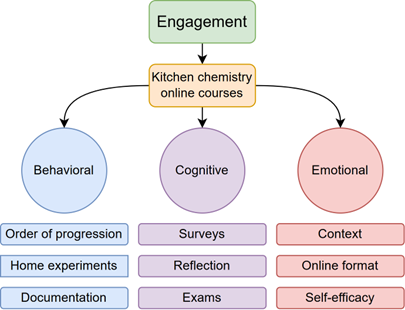Engagement through experiments
Experiences from online kitchen chemistry courses
DOI:
https://doi.org/10.31129/LUMAT.13.1.2683Keywords:
engagement, home experiments, kitchen chemistry, online education, science educationAbstract
The experimental nature of chemistry education is highly challenging in online teaching and the lack of practical assignments prevents online science education from reaching its full potential. This study investigates how student engagement can be achieved by implementing experiments in online teaching. Two asynchronous self-paced online courses were developed and offered to broad audience. The courses taught chemistry in the kitchen chemistry context and included phenomenon-based learning through practical assignments related to food preparation. Analysis of the course participants’ responses to various surveys shows that according to the students, they were able to observe the connection between theory and experimentation in each assignment. Also, 85% of students who completed the first practical assignment were motivated enough to finish the whole course. These findings highlight the importance of behavioural, emotional and cognitive engagement created by meaningful learning tasks.
References
Adipat, S. (2024). Transcending traditional paradigms: The multifaceted realm of phenomenon-based learning. Frontiers in Education, 9. https://doi.org/10.3389/feduc.2024.1346403 DOI: https://doi.org/10.3389/feduc.2024.1346403
Applied Kitchen Chemistry. (n.d.). University of Jyväskylä Study Guide. Retrieved 5 March 2025, from https://studyguide.jyu.fi/en/courseunit/kemy1002/
Cavinato, A. G., Hunter, R. A., Ott, L. S., & Robinson, J. K. (2021). Promoting student interaction, engagement, and success in an online environment. Analytical and Bioanalytical Chemistry, 413(6), 1513–1520. https://doi.org/10.1007/s00216-021-03178-x DOI: https://doi.org/10.1007/s00216-021-03178-x
Chemistry in Kitchen. (n.d.). University of Jyväskylä Study Guide. Retrieved 5 March 2025, from https://studyguide.jyu.fi/en/courseunit/kemy1001/
Dhawan, S. (2020). Online Learning: A Panacea in the Time of COVID-19 Crisis. Journal of Educational Technology Systems, 49(1), 5–22. https://doi.org/10.1177/0047239520934018 DOI: https://doi.org/10.1177/0047239520934018
Díez-Pascual, A. M., & Jurado-Sánchez, B. (2022). Remote Teaching of Chemistry Laboratory Courses during COVID-19. Journal of Chemical Education, 99(5), 1913–1922. https://doi.org/10.1021/acs.jchemed.2c00022 DOI: https://doi.org/10.1021/acs.jchemed.2c00022
Edelson, D. C. (2002). Design Research: What We Learn When We Engage in Design. The Journal of the Learning Sciences, 11(1), 105–121. DOI: https://doi.org/10.1207/S15327809JLS1101_4
Fredricks, J. A., Blumenfeld, P. C., & Paris, A. H. (2004). School Engagement: Potential of the Concept, State of the Evidence. Review of Educational Research, 74(1), 59–109. https://doi.org/10.3102/00346543074001059 DOI: https://doi.org/10.3102/00346543074001059
Grosser, A. E. (1984). Cooking with chemistry. Journal of Chemical Education, 61(4), 362. https://doi.org/10.1021/ed061p362 DOI: https://doi.org/10.1021/ed061p362
Hofstein, A. (2015). The Development of High-Order Learning Skills in High School Chemistry Laboratory: “Skills for Life”. In Chemistry Education (pp. 517–538). John Wiley & Sons, Ltd. https://doi.org/10.1002/9783527679300.ch21 DOI: https://doi.org/10.1002/9783527679300.ch21
Hong, J.-C., Liu, Y., Liu, Y., & Zhao, L. (2021). High School Students’ Online Learning Ineffectiveness in Experimental Courses During the COVID-19 Pandemic. Frontiers in Psychology, 12. https://www.frontiersin.org/articles/10.3389/fpsyg.2021.738695 DOI: https://doi.org/10.3389/fpsyg.2021.738695
Huang, J. (2020). Successes and Challenges: Online Teaching and Learning of Chemistry in Higher Education in China in the Time of COVID-19. Journal of Chemical Education, 97(9), 2810–2814. https://doi.org/10.1021/acs.jchemed.0c00671 DOI: https://doi.org/10.1021/acs.jchemed.0c00671
Jegstad, K. M. (2023). Inquiry-based chemistry education: A systematic review. Studies in Science Education, 0(0), 1–63. https://doi.org/10.1080/03057267.2023.2248436 DOI: https://doi.org/10.1080/03057267.2023.2248436
Johnstone, A. H. (2000). TEACHING OF CHEMISTRY - LOGICAL OR PSYCHOLOGICAL? Chemistry Education Research and Practice, 1(1), 9–15. https://doi.org/10.1039/A9RP90001B DOI: https://doi.org/10.1039/A9RP90001B
Krippendorff, K. (2019). Content Analysis: An Introduction to Its Methodology (Fourth Edition). SAGE Publications, Inc. https://doi.org/10.4135/9781071878781 DOI: https://doi.org/10.4135/9781071878781
Miltiadous, A., Callahan, D. L., & Schultz, M. (2020). Exploring Engagement as a Predictor of Success in the Transition to Online Learning in First Year Chemistry. Journal of Chemical Education, 97(9), 2494–2501. https://doi.org/10.1021/acs.jchemed.0c00794 DOI: https://doi.org/10.1021/acs.jchemed.0c00794
Neuendorf, K. A. (2017). The Content Analysis Guidebook (Second). SAGE Publications, Inc. https://doi.org/10.4135/9781071802878 DOI: https://doi.org/10.4135/9781071802878
Nguyen, J. G., & Keuseman, K. J. (2020). Chemistry in the Kitchen Laboratories at Home. Journal of Chemical Education, 97(9), 3042–3047. https://doi.org/10.1021/acs.jchemed.0c00626 DOI: https://doi.org/10.1021/acs.jchemed.0c00626
Nuora, P., & Välisaari, J. (2019). Kitchen chemistry course for chemistry education students: Influences on chemistry teaching and teacher education – a multiple case study. Chemistry Teacher International, 2(1). https://doi.org/10.1515/cti-2018-0021 DOI: https://doi.org/10.1515/cti-2018-0021
Schaffar, B., & Wolff, L.-A. (2024). Phenomenon-based learning in Finland: A critical overview of its historical and philosophical roots. Cogent Education, 11(1), 2309733. https://doi.org/10.1080/2331186X.2024.2309733 DOI: https://doi.org/10.1080/2331186X.2024.2309733
Schultz, M., Callahan, D. L., & Miltiadous, A. (2020). Development and Use of Kitchen Chemistry Home Practical Activities during Unanticipated Campus Closures. Journal of Chemical Education, 97(9), 2678–2684. https://doi.org/10.1021/acs.jchemed.0c00620 DOI: https://doi.org/10.1021/acs.jchemed.0c00620
Seery, M. K., Agustian, H. Y., Christiansen, F. V., Gammelgaard, B., & Malm, R. H. (2024). 10 Guiding principles for learning in the laboratory. Chemistry Education Research and Practice, 25(2), 383–402. https://doi.org/10.1039/D3RP00245D DOI: https://doi.org/10.1039/D3RP00245D
Sjöström, J., Eilks, I., & Talanquer, V. (2020). Didaktik Models in Chemistry Education. Journal of Chemical Education, 97(4), 910–915. https://doi.org/10.1021/acs.jchemed.9b01034 DOI: https://doi.org/10.1021/acs.jchemed.9b01034
Spinks, M., Metzler, M., Kluge, S., Langdon, J., Gurvitch, R., Smitherman, M., Esmat, T., Bhattacharya, S., Carruth, L., Crowther, K., Denton, R., Edwards, O. V., Shrikhande, M., & Strong-Green, A. (2023). “This Wasn’t Pedagogy, It Was Panicgogy”: Perspectives of the Challenges Faced by Students and Instructors during the Emergency Transition to Remote Learning Due to COVID-19. College Teaching, 71(4), 227–243. https://doi.org/10.1080/87567555.2021.2018395 DOI: https://doi.org/10.1080/87567555.2021.2018395
Sun, J. C.-Y., & Rueda, R. (2012). Situational interest, computer self-efficacy and self-regulation: Their impact on student engagement in distance education. British Journal of Educational Technology, 43(2), 191–204. https://doi.org/10.1111/j.1467-8535.2010.01157.x DOI: https://doi.org/10.1111/j.1467-8535.2010.01157.x
Taber, K. S. (2019). Experimental research into teaching innovations: Responding to methodological and ethical challenges. Studies in Science Education, 55(1), 69–119. https://doi.org/10.1080/03057267.2019.1658058 DOI: https://doi.org/10.1080/03057267.2019.1658058
Vai, M., & Sosulski, K. (2011). Essentials of Online Course Design: A Standards-Based Guide. Routledge. https://doi.org/10.4324/9780203838310 DOI: https://doi.org/10.4324/9780203838310
Zheng, M., Bender, D., & Lyon, C. (2021). Online learning during COVID-19 produced equivalent or better student course performance as compared with pre-pandemic: Empirical evidence from a school-wide comparative study. BMC Medical Education, 21(495). https://doi.org/10.1186/s12909-021-02909-z DOI: https://doi.org/10.1186/s12909-021-02909-z

Downloads
Published
How to Cite
Issue
Section
Categories
License
Copyright (c) 2025 Asmo Roponen, Jouni Välisaari, Jan Lundell

This work is licensed under a Creative Commons Attribution 4.0 International License.









